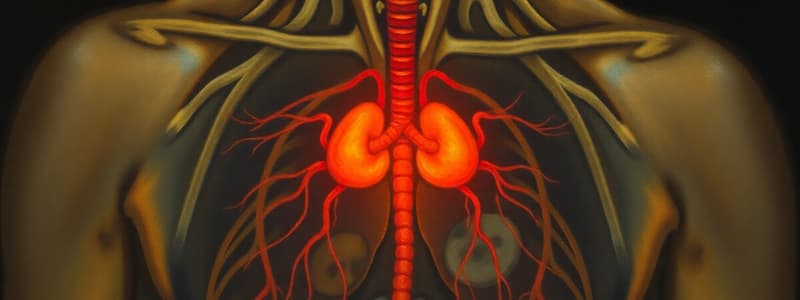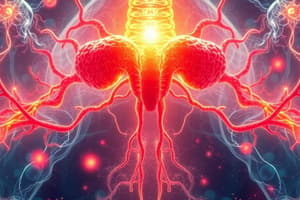Podcast
Questions and Answers
Which condition is characterized by muscle wasting and poor wound healing?
Which condition is characterized by muscle wasting and poor wound healing?
- Cushing syndrome (correct)
- Pheochromocytoma
- Addison’s disease
- Hyperthyroidism
What is one of the effects of catecholamines released from the adrenal medulla during stress?
What is one of the effects of catecholamines released from the adrenal medulla during stress?
- Increased fat storage
- Vasoconstriction (correct)
- Decreased heart rate
- Increased urge to urinate
In the absence of antidiuretic hormone (ADH), what happens to urine volume?
In the absence of antidiuretic hormone (ADH), what happens to urine volume?
- It becomes concentrated and decreases
- It remains unchanged
- It decreases significantly
- It increases and becomes diluted (correct)
Which hormone's secretion is significantly increased during labor and is influenced by estrogen?
Which hormone's secretion is significantly increased during labor and is influenced by estrogen?
Which condition is characterized by an overproduction of catecholamines?
Which condition is characterized by an overproduction of catecholamines?
What physiological effect does high concentration of antidiuretic hormone (ADH) have?
What physiological effect does high concentration of antidiuretic hormone (ADH) have?
What is a symptom of hypocortisolism?
What is a symptom of hypocortisolism?
Which of the following is a characteristic function of the pituitary gland?
Which of the following is a characteristic function of the pituitary gland?
What is the primary hormone secreted by the adrenal cortex that regulates sodium absorption?
What is the primary hormone secreted by the adrenal cortex that regulates sodium absorption?
Which of the following conditions stimulates the release of aldosterone?
Which of the following conditions stimulates the release of aldosterone?
What characterizes hyperaldosteronism?
What characterizes hyperaldosteronism?
What role do glucocorticoids play in metabolism?
What role do glucocorticoids play in metabolism?
Which of the following effects characterizes the action of glucocorticoids on blood cells?
Which of the following effects characterizes the action of glucocorticoids on blood cells?
What is the diurnal pattern of cortisol levels characterized by?
What is the diurnal pattern of cortisol levels characterized by?
How does cortisol affect protein metabolism?
How does cortisol affect protein metabolism?
What effect does adrenal cortisol have on gastric functions?
What effect does adrenal cortisol have on gastric functions?
Flashcards
Cortisol
Cortisol
A hormone produced by the adrenal cortex that regulates blood sugar levels and helps the body respond to stress.
Cushing's Syndrome
Cushing's Syndrome
A condition caused by excess cortisol production, characterized by symptoms like weight gain, moon face, buffalo hump, and muscle weakness.
Addison's Disease
Addison's Disease
A condition caused by insufficient cortisol production, often leading to fatigue, weakness, and low blood pressure.
Catecholamines
Catecholamines
Signup and view all the flashcards
Antidiuretic Hormone (ADH)
Antidiuretic Hormone (ADH)
Signup and view all the flashcards
Oxytocin
Oxytocin
Signup and view all the flashcards
Endocrine Glands
Endocrine Glands
Signup and view all the flashcards
Pituitary Gland
Pituitary Gland
Signup and view all the flashcards
Zona Glomerulosa
Zona Glomerulosa
Signup and view all the flashcards
Aldosterone
Aldosterone
Signup and view all the flashcards
Hyperaldosteronism
Hyperaldosteronism
Signup and view all the flashcards
Hypoaldosteronism
Hypoaldosteronism
Signup and view all the flashcards
Zona Fasciculata
Zona Fasciculata
Signup and view all the flashcards
Anti-insulin Effect of Cortisol
Anti-insulin Effect of Cortisol
Signup and view all the flashcards
Anti-inflammatory Effects of Cortisol
Anti-inflammatory Effects of Cortisol
Signup and view all the flashcards
Study Notes
Endocrine System Overview
- Endocrine glands secrete hormones, regulating various bodily functions.
- The pituitary gland is the "master gland," controlling other endocrine glands.
Adrenal Glands
- Located near the kidneys.
- The adrenal cortex, controlled by ACTH from the pituitary, releases steroid hormones.
- ACTH release is triggered by stress (e.g., low blood sugar, low body temperature, shock).
- The adrenal medulla, part of the sympathetic nervous system, produces catecholamines (e.g., epinephrine, norepinephrine).
Adrenal Gland Hormones
-
Mineralocorticoids (e.g., aldosterone): Regulate sodium and potassium balance in the kidneys.
- Released in response to hyponatremia, hyperkalemia, and angiotensin II.
- Increased secretion is called hyperaldosteronism (leading to hypokalemia and metabolic alkalosis).
- Decreased secretion is called hypoaldosteronism (leading to hyperkalemia and metabolic acidosis).
-
Glucocorticoids (e.g., cortisol): Vital for life, influencing various organs.
- Cortisol's effects encompass metabolic processes, cardiovascular function, and suppressing the immune response.
-
Androgens (e.g., DHEA): Play a role in sexual development.
-
Catecholamines (e.g., epinephrine, norepinephrine): Released in response to stress, for quick responses (fight-or-flight).
- These increase blood pressure and heart rate, increase metabolic rate, and cause glycogenolysis.
Glucocorticoid Effects
- Metabolic: Influence carbohydrate metabolism (anti-insulin effect), increasing blood sugar through gluconeogenesis; also decrease glucose utilization and increase protein catabolism.
- Metabolic: Affect lipolysis and fat redistribution.
- Cardiovascular: Maintaining normal cardiovascular function and responsiveness to catecholamines.
- Hematological: Decreases blood cells (except RBC and platelets), with anti-inflammatory effects on eosinophils, basophils, and lysosomes.
- Gastrointestinal: Increases gastric HCl secretion and decreased mucosal cell proliferation, (increases risk of ulcers).
- Psychological: Can cause euphoria, psychosis, depression and paranoia.
- Other: Increases lung surfactant in late pregnancy. Exerts an aldosterone-like effect.
- Circadian Rhythm: Cortisol levels follow a daily pattern, highest before waking and lowest at night.
Hypercortisolism (Cushing's Syndrome)
- Characterized by excessive cortisol production.
- Symptoms include moon face, buffalo hump, thin skin, muscle wasting, poor wound healing, osteoporosis.
Hypocortisolism (Addison's Disease)
- Characterized by insufficient cortisol production.
- Symptoms include fatigue, weakness, anorexia, weight loss, hyperpigmentation, postural dizziness, gastrointestinal problems, and decreased libido.
Antidiuretic Hormone (ADH)
- Regulates body water balance by influencing distal nephron permeability to water and increasing water reabsorption.
- Stimulates vascular smooth muscle contraction, increasing blood pressure (significant in hypovolemic shock).
Oxytocin
- A hypothalamus-derived hormone stored in the posterior pituitary.
- Released in response to nerve signals from stretch receptors in the cervix (during labour) and touch receptors in the nipples (milk ejection).
- Important in childbirth (labor and uterine contractions) and breastfeeding.
- Its release is enhanced by estrogen and antagonized by progesterone during pregnancy. Increased oxytocin sensitivity exists during late pregnancy.
Other important aspects of the endocrine system (from the last page of provided text)
- Pituitary gland is the master gland controlling many other endocrine glands' function involving growth hormone, prolactin, and ADH.
- Thyroid gland releases thyroxine, affecting metabolic rate.
- Pancreas releases insulin to lower blood glucose and glucagon to raise it.
- Adrenal glands produce cortisol (increase blood glucose), aldosterone (increase blood sodium), adrenaline, and noradrenaline (affect heart rate and blood pressure).
Studying That Suits You
Use AI to generate personalized quizzes and flashcards to suit your learning preferences.
Related Documents
Description
Explore the essential functions of the endocrine system, focusing on the pituitary and adrenal glands. This quiz covers hormone secretion, regulation of bodily functions, and the role of mineralocorticoids and glucocorticoids. Test your knowledge on how these hormones affect health and balance.



